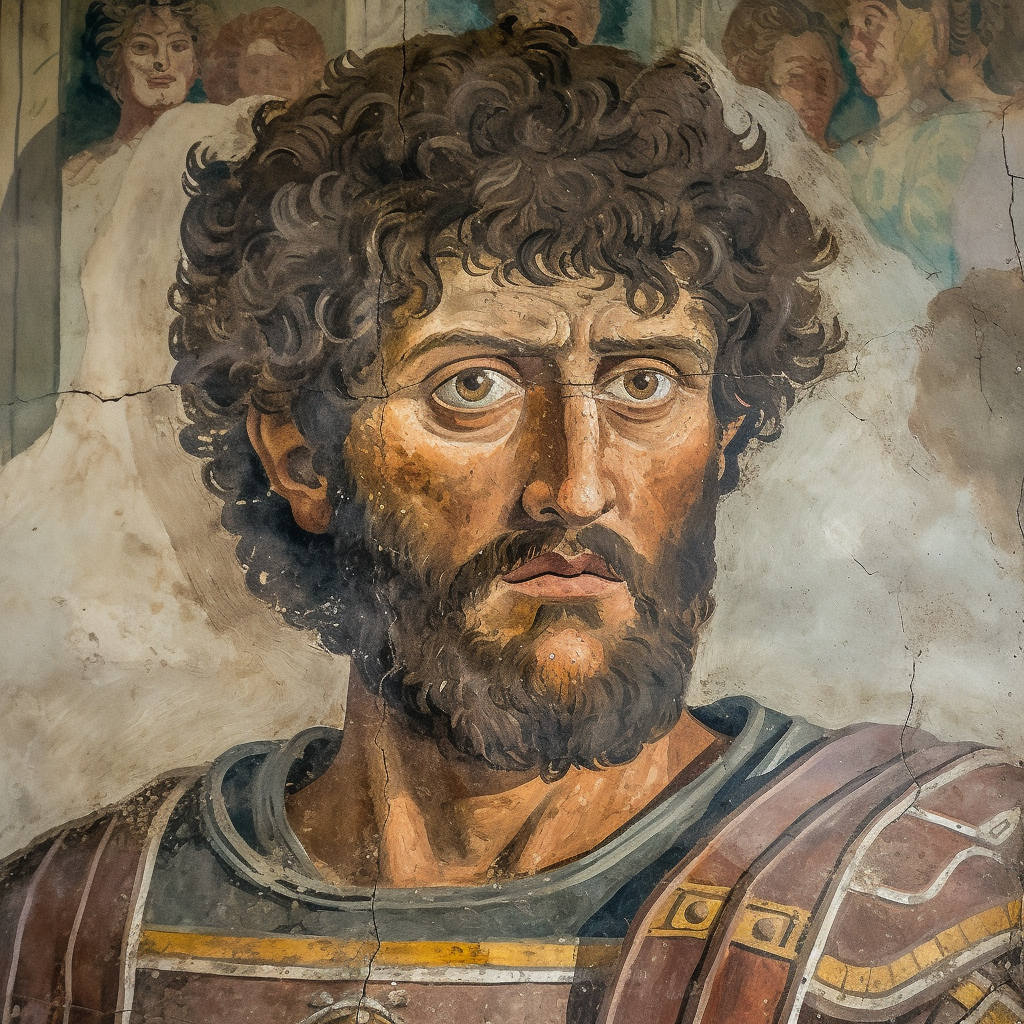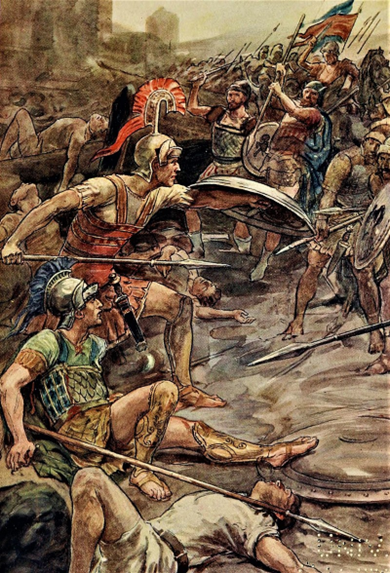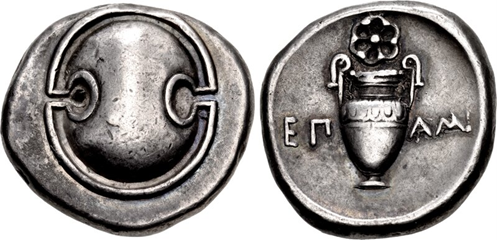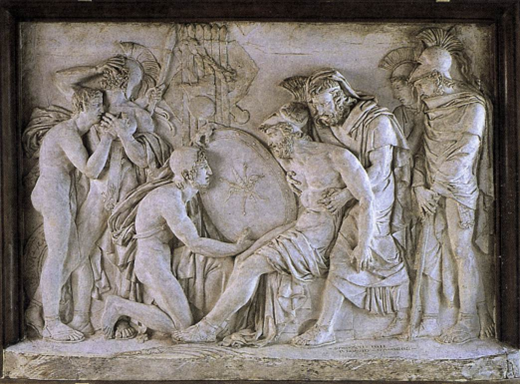Epaminondas
Great Ruler of Thebes

Epaminondas was described by Cicero as "the first man of Greece." He was the greatest conqueror of the Greek states prior to the Hellenistic period, a force guided by the Gods, who attacked tyranny and injustice throughout the land, bringing his native Thebes to the zenith of its power against the combined and formidable forces of Sparta, Athens, and other Greek states.
His policies of cultural union and the liberation of oppressed peoples in Greece presaged the unification of the Hellenic world under Philip and Alexander. Equivalent to Pericles in Athens and King Leonidas in Sparta, Epaminondas’ name is written in history as the most legendary leader of Thebes.
EARLY LIFE
He did not come from a particularly privileged aristocratic background, yet it was one of great fame, as he claimed descent from Cadmus, the legendary ancestor of the Theban people. As a child, Epaminondas studied intensively under Lysis, a major Pythagorean philosopher from the colonial city of Tarentum, who would heavily influence his views on statecraft. The Pythagorean had sought refuge after being persecuted and lived in the house of Epaminondas' father.
Epaminondas quickly became a prodigy in music and other areas. He showed extreme devotion to Lysis and supported his tutor throughout his life. In general, the Theban created an inner circle of learned men who continued to assist him in his lifelong quest to unite Greece.
From a young age, he was known for his measured and virtuous habits, which inspired devotion in others. He maintained a particularly frugal lifestyle and practiced many forms of selflessness toward others, including the poor. He found bribery unconscionable and was generous to his friends, particularly the learned, whose counsel he valued deeply and believed should be compensated.
Therefore, to his physical strength were added even greater mental gifts: he was temperate, prudent, serious, and skillful in seizing opportunities. He was trained in warfare, brave, and spirited, such a lover of truth that he never lied, even in jest. Furthermore, he had complete self-control, was kind and forbearing to a surprising degree, and endured wrongs not only from the public but even from his own friends. He was meticulous in keeping secrets, a trait sometimes as valuable as eloquence, and he was a good listener, believing that listening was the surest path to acquiring knowledge. Whenever he was in a gathering where state matters or philosophical discussions were taking place, he would never leave until the conversation had concluded.
He found it easy to endure hardship, and from his public service he gained nothing but glory, refusing even to use the wealth of his friends for his own needs. In aiding others, however, he made such generous use of their trust that one might suppose he and his friends shared all things in common. 1
Numerous times, the Persians attempted to bribe him with vast sums of money at the personal initiative of Artaxerxes, the King of Kings. Every time, Epaminondas refused.
His best friend from a young age was Pelopidas, a man who faithfully enacted whatever Epaminondas wished and came to serve as a second leader in Thebes. Their bond was sealed when Epaminondas saved Pelopidas’ life. Many later biographers found strong parallels between his life and that of Alexander a generation later. It is known that Alexander held both Cyrus of Persia and Epaminondas as role models in equal measure.

Angling to join the Theban military from a young age, Epaminondas demonstrated unflinching valor in several battles, rising quickly to become a commander due to his exceptional talent. He eventually joined the Sacred Band, a group of elite cavalrymen considered the steely core of the Theban army. This military prowess aligned with some of the cruder but necessary aspects of his personality.
Nonetheless, Thebes had long been under the yoke of Sparta. Phoebidas, a Spartan commander, exploited a military maneuver to occupy the Cadmea, the city's formidable fortress. The Spartans used this to expel their enemies and maintain strict control over the population. This occupation lasted fifteen years.
The young soldier saw this as a symptom of decay. In his eyes, many aspects of Theban life were in urgent need of ethical, cultural, and political reform. He was also deeply concerned about the resurgent power of Persia attempting to reassert control over Greece at the very moment Sparta pursued a policy of extreme aggression, weakening the other Greek states. For Epaminondas and Pelopidas, it was time to strike.
SEIZURE OF THEBES
Together with Gorgidas, leader of the Sacred Band, the two men carefully sowed dissent within the Theban military ranks and plotted to overthrow the Spartan garrison in the Cadmea. They enlisted the help of some Athenian hoplites and gave speeches to the assembly. It was a perilous and nearly suicidal move to attack the most valiant force in Greece. Sparta was only outmatched after three relentless days of man-to-man combat and risky ambush tactics. Yet, against all odds, the Theban forces compelled the Spartans to abandon the city.
Epaminondas quickly set to work establishing a new order in Thebes, some of it based on Pythagorean principles that had been tested in Croton and other cities. His reforms of the populace and the strengthening of the military soon made Thebes the dominant power in Greece.
Sparta continued to ruin, plunder, and devastate the rural regions of Boeotia, the territory surrounding Thebes. However, these actions only served to increase Epaminondas' popularity as the new ruler of much of Greece.
He revived the alliance and confederacy of cities in Boeotia that had once been under Theban control. Mindful of the resentment toward aristocracy, of which his hieratic friends had warned him, Epaminondas instituted a somewhat democratic form of government, though more limited than that of Athens. The Boeotarch, or governor, of the province was elected annually.
BATTLE OF LEUCTRA
A peace agreement with Persian elements took place shortly afterward. It was a demand from the Spartan side, backed by Persia, that things return to the order they had been in prior. Failure to comply would mean the destruction of Thebes.
Consequently, Thebes prepared for war. Following the breakdown of the peace agreement, the Spartan king Cleombrotus marched into Theban territory from Phocis, another region in Greece.
Epaminondas displayed his military genius in this battle. Traditionally in Greece, the most powerful parts of any army fought on the right flank. Instead of concentrating force there, he pivoted to the left, placing his most important cavalry and massed infantry in a tightly bound formation. In doing so, he directed his most skilled and fearsome warriors to attack the strongest element of the Spartan army head-on, a revolutionary idea.
He opted for timing and technique instead of tradition. The swift and decisive strike against Cleombrotus caught the Spartans completely by surprise, particularly as they were mid-maneuver. Epaminondas demonstrated a mastery of driving soldiers in an orderly formation with complex movements, something Greece had not seen before. Even Xenophon, hostile to Thebes, praised Epaminondas for his ability to train his forces.
These methods of surprise and precision in battle would later be adopted by Philip II, Alexander, and other great conquerors in history.
The Peace Congress held after the battle was no less brutal. Epaminondas attacked Sparta in a speech so visceral that many of Sparta’s allies defected on the spot. He asserted Thebes’ right to control Boeotia and claimed that any suggestion to the contrary was sheer hypocrisy.
After this, Arcadian cities north of Sparta, such as Argea, decided to form an alliance to protect their interests. Sparta, outraged by this defiance, once again laid waste to the region. At that point, Epaminondas led his armies into the Peloponnese to support the Arcadian alliance, further shattering Sparta’s hegemony.
THE THEBAN HEGEMONY
Upon his return to Thebes, he was put on trial for forcing leaders and magistrates to fight for their country beyond their term limits. As always, Epaminondas was defiant. He refuted the accusations by pointing out the absurdity of imprisoning the very man who had liberated Thebes itself, an oxymoron that led to his triumphant acquittal.

minted c. 364–362 BCE by Epaminondas, whose name EΠ-AMI is inscribed on the reverse
Though Epaminondas had secured Theban dominance over the rest of Greece, other states began to resent the resurgence of the city. He made multiple attempts to sue for peace, even involving Artaxerxes to promise non-intervention, but to little avail.
Despite these tensions, Epaminondas focused on consolidating Theban hegemony through diplomacy and targeted military maneuvers. He orchestrated fresh coalitions among smaller Peloponnesian states eager to resist Spartan or Athenian dominance, and he continued championing the cause of regional autonomy for allies such as the Arcadians and Messenians. However, maintaining these alliances proved difficult: the complex rivalries and shifting loyalties across Greece demanded constant vigilance, and Theban resources were stretched thinner with each campaign.
BATTLE OF MANTINEA
Growing hostilities culminated in the Battle of Mantinea, where Epaminondas led the Theban army into what he hoped would be a decisive clash against Sparta to cement Theban leadership.

Although the Thebans emerged tactically victorious on the battlefield, Epaminondas himself was mortally wounded. His death deprived Thebes of its most visionary commander. The loss of the Boeotarch shocked Greece. On one hand, Sparta’s power lay in ruins forever. Yet without his guiding influence, the Theban coalition began to fracture. Thebes returned to its old habits of internal division, driven by resentment toward his leadership. This marked the end of Theban supremacy and ushered in renewed competition among the major Greek powers, with one rising above the rest: Macedon, to the north.
Aftermath and Memory
Emperor Hadrian later built an entirely new statue of Epaminondas next to the one originally erected in ancient Thebes, which is one of the few things left standing after Alexander’s destruction of the city, beside the house of Pindar. This was a testament to his grandeur in ancient times. He was admired not only as a military genius but also as a reformer who aimed to align the morals of the state with the will of the Gods. As the model of the philosopher-king, Epaminondas served as a major inspiration for Alexander, who sought to avoid the same internal strife that had plagued Thebes, prompting him to transcend the limited confines of Macedonia.
Inscription on Statue of Epaminondas:
By my counsels Sparta was shorn of her glory, and holy Messene at long last takes back her sons: by Theban arms has Megale Polis been crowned, and all Hellas rules itself in freedom.
BIBLIOGRAPHY:
1 The Book on the Great Generals of Foreign Nations, Cornelius Nepos
Hellenica, Xenophon
CREDIT:
Karnonnos [SG]

 አማርኛ
አማርኛ العربية
العربية বাংলা
বাংলা Български
Български 中文
中文 Čeština
Čeština Dansk
Dansk Deutsch
Deutsch Eesti
Eesti Ελληνικά
Ελληνικά Español
Español Français
Français हिन्दी
हिन्दी Hrvatski
Hrvatski IsiZulu
IsiZulu Italiano
Italiano 日本語
日本語 Kiswahili
Kiswahili Magyar
Magyar Македонски
Македонски नेपाली
नेपाली Nederlands
Nederlands فارسی
فارسی Polski
Polski Português
Português Română
Română Русский
Русский Slovenščina
Slovenščina Suomi
Suomi Svenska
Svenska Tagalog
Tagalog Türkçe
Türkçe